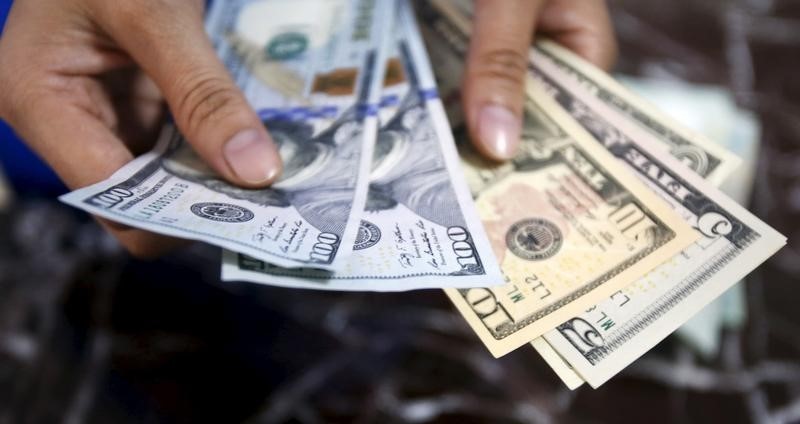 © Reuters.
© Reuters.
By Peter Nurse
Investing.com - The U.S. dollar held firm in early European trade Monday, just off a 20-year high as traders sought out this safe haven amid concerns of slowing global growth and rising geopolitical tensions.
At 4:15 AM ET (0715 GMT), the Dollar Index, which tracks the greenback against a basket of six other currencies, traded largely flat at 104.597, having briefly crossed the 105 level on Friday, its highest since December 2002.
Investors have sought out the safe-haven greenback due to concerns about the U.S. Federal Reserve's ability to tame high inflation without causing a recession, worries about slowing growth arising from the war in Ukraine as well as the economic impact of China's lockdowns to curb its latest COVID-19 outbreak.
Goldman Sachs added to concerns about U.S. growth for this year, with the investment bank cutting its forecasts to reflect the shake-out in financial markets amid the Federal Reserve’s tightening of monetary policy.
The bank now expects the economy to grow 2.4% this year and 1.6% in 2023, down from 2.6% and 2.2% previously.
Adding to worries of a global slowdown were disappointing data out of China. April retail sales plunged 11.1% on the year, almost twice the drop forecast, while industrial output fell 2.9% instead of the slight increase expected, illustrating the deep damage COVID lockdowns were doing to the world's second largest economy.
Persistent geopolitical tensions surrounding the war in Ukraine are also adding to demand for the dollar, following moves over the weekend by Finland and Sweden toward joining the North Atlantic Treaty Organization.
Moscow has consistently warned about potential consequences of such a move, particularly by Finland which has a long border with Russia, and thus this is likely to amplify tensions.
“The market’s concerns around the combination of Fed tightening and expected global slowdown continue to argue in favor of volatility and instability in risk assets,” said analysts at ING, in a note. “Ultimately, this should keep many investors interested in buying the dollar dips.”
EUR/USD fell 0.1% to 1.0406, only just above the 1.0354 level it hit on Thursday, its lowest since early 2017, while USD/JPY dropped 0.2% to 128.94, recovering from last week’s low of 131.35.
GBP/USD fell 0.1% to 1.2243, having dropped as low as 1.2156 last week, hurt by softer-than-expected first quarter GDP figures.
The UK is to release inflation data on Wednesday that is expected to show consumer prices leaped to 9.1% on a year-over-year basis in April, in what would be the largest jump in annual inflation since 1980 and the fastest rate of inflation since 1982.
USD/CNY rose 0.1% to 6.7975 and AUD/USD dropped 0.7% to 0.6892, with both the yuan and the Australian dollar hurt by the weaker-than-expected Chinese data for April.

